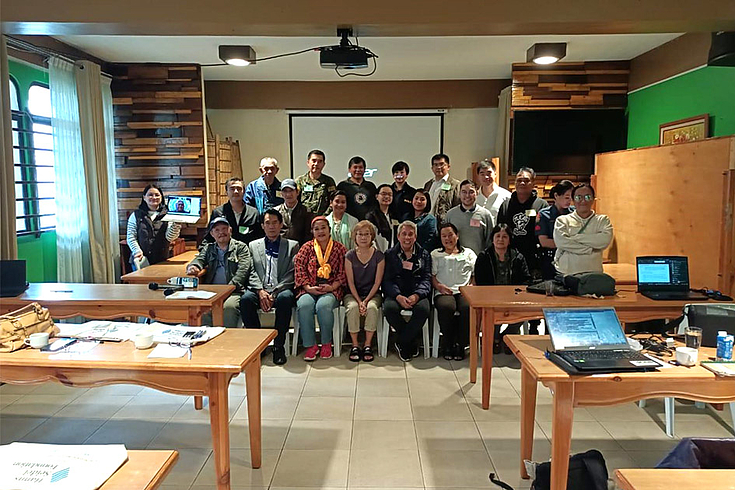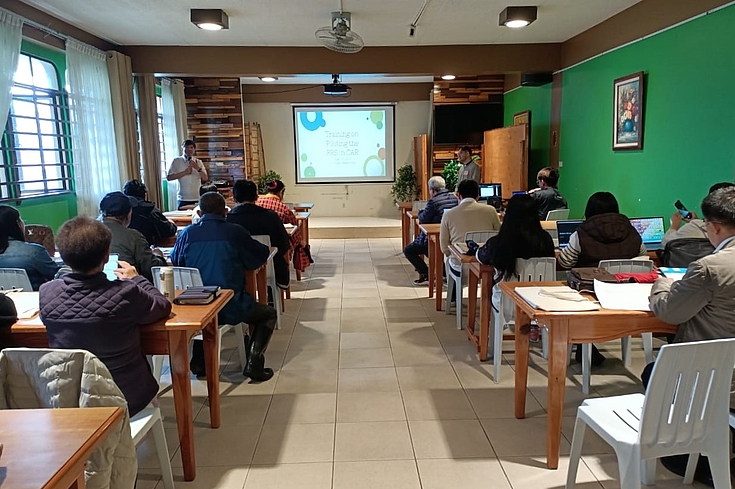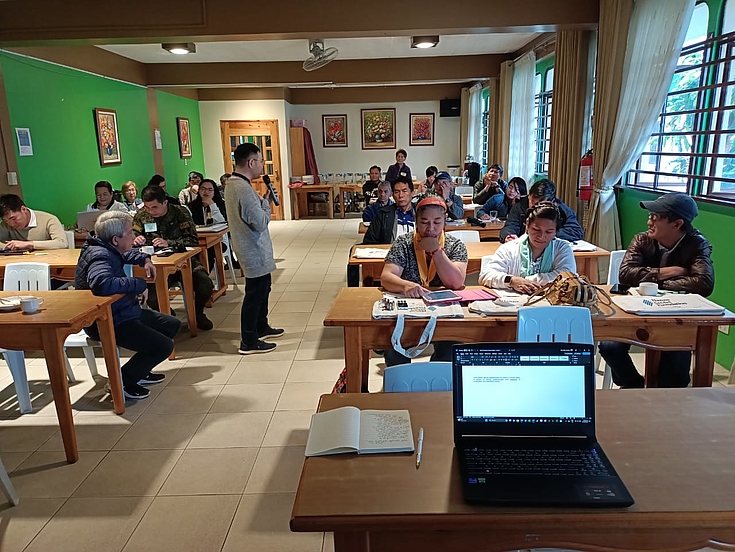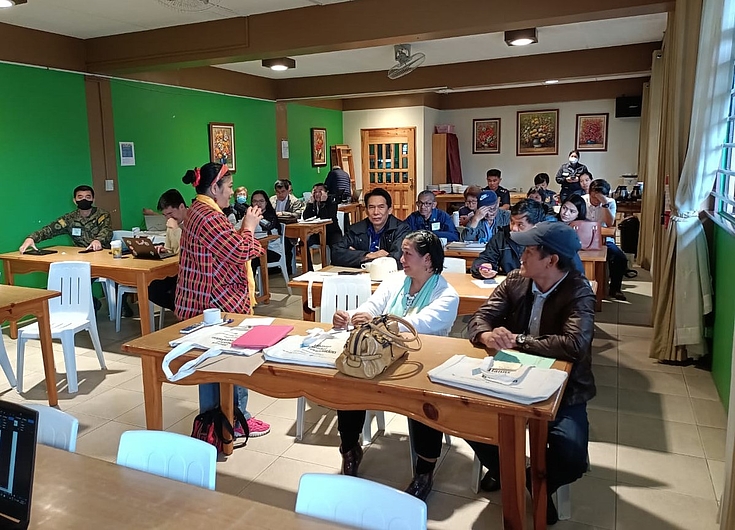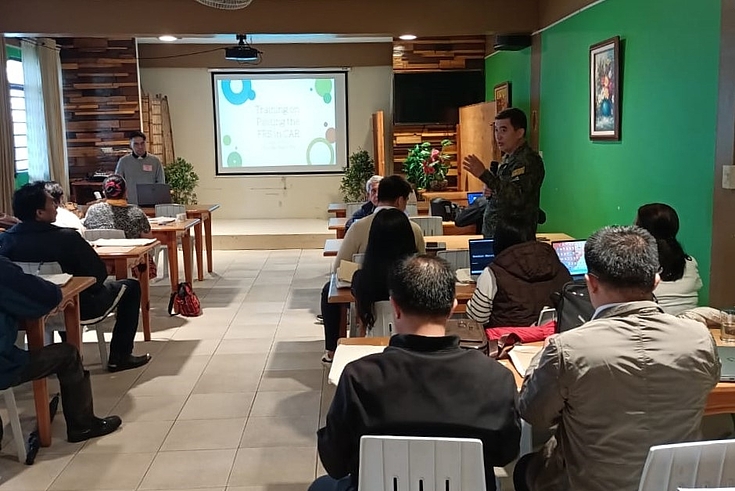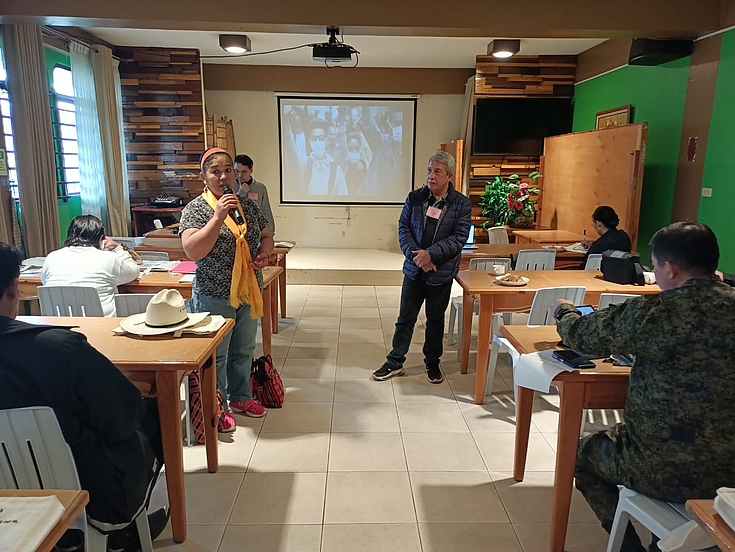Community-based Dialogues Project (CBD)
Capacity-building on Piloting the Feedback and Referral System (FRS) in the Cordillera Administrative Region (CAR)
HSF
The activity, which was organized by the Alternative Law Groups (ALG) and the Commission on Human Rights-Cordillera Administrative Region (CHR-CAR) with the support of the Hanns Seidel Foundation (HSF), was attended by more than 30 participants comprising of officers of the Barangay Human Rights Action Centers (BHRAC) Federation of Baguio City; barangay officials of pilot barangays; officers and staff of the CHR-CAR led by its Regional Director, Atty. Romel Daguimol and from the Central Office; members of the CBD CAR Core group; and key representatives from civil society organizations (CSOs), Police Regional Human Rights Affairs Office (RHRAO) and PNP Human Rights Affairs Office (HRAO) from the National Headquarters; Philippine Army (AFP-PA) 5th Infantry Division & 54th Infantry Brigade (onsite & online), government agencies, HSF and ALG.
The following objectives were achieved: (i) To ensure participants understand the FRS concept, purpose/objectives, significance, and its role in addressing HRVs; (ii) Participants should recognize the value of local partnerships and collaborations in examining complaint data management; (iii) Participants should be able to address challenges and establish safeguards to promote accessibility and user-friendliness of the Feedback and Referral System (FRS); and (iv) To enhance monitoring and evaluation, develop Action Plans for FRS implementation in the 5 pilot barangays.
HSF
Atty. R. Daguimol gave the Welcome Remarks. He noted that the activity aims to actualize the FRS for reporting and monitoring of human rights violations (HRVs) especially at the barangay level in collaboration with CSOs. He mentioned the FRS will be implemented in 5 pilot barangays in Baguio City in partnership with the LGU, CBD PSC through ALG, and CHR-CAR. He expressed hope that with the FRS, human rights issues and concerns will be referred properly, acted upon, and appropriate interventions/remedies will be provided. The participants looked forward to learn more about the workings of the FRS, and to have a simple, timely and accessible feedback and reporting mechanism for HRVs.
Mr. Rene Clemente, ALG Program Officer, presented an overview of the FRS from the time it was conceptualized to present. He stated that it is a structured mechanism for victims and witnesses of HRVs to report, provide information, gather feedback, and monitor or receive information on actions taken regarding their complaint/s. He added that in piloting the FRS for a period of time, it is expected that challenges/problems as well as potential areas for improvement will be brought up for consideration in the roll-out of the FRS in other areas in the future. He explained the role of the FRS in addressing HRVs such as providing a safe space for victims and witnesses to report HR-related issues, gather information on the types of HR-related issues in the area, and allow information on actions taken on complaint back to victim/complainant. He underscored the benefits of an effective FRS implementation such as victims gaining more confidence in reporting HRVs and increased trust in the system that there are remedies to HRVs.
HSF
During the Open Forum, the following comments were raised: (i) not all barangays have enough resources; (ii) how to sustain the FRS training; (iii) need support from LGU and private agencies; (iv) clarify scope & limitations of FRS; (v) respect traditional/local ways of resolving conflicts/cases (e.g., indigenous justice system, barangay justice system); (vi) all barangays have a human rights committee.
Atty. Gian Arabejo of ALG presented “General Concepts and Principles on Human Rights.” He underscored 4 key principles – human rights are inherent, universal, inter-related and inalienable. He cited a couple of cases to highlight these principles. He mentioned several local and international laws/treaties recognizing human rights such as the Philippine constitution, Anti-Torture Law, Anti-Enforced Disappearance Law, Universal Declaration of Human Rights, International Covenant on Civil and Political Rights (ICCPR), International Covenant on Economic, Social and Cultural Rights (ICESCR), and Sustainable Development Goals (SDGs). He stated the implementation of ICCPR is absolute & immediate and non-interference from government, while that of ICESCR is qualified & progressive and allows interference from government depending on its capacity and resources.
During the Open Forum, clarifications were made: (i) civilians can also commit human rights violations; (ii) CHR monitors HRVs of government; (iii) a civilian can make a “citizen’s arrest;” (iv) agents of a person in authority can apply the police power of a barangay such as making arrests (e.g., “barangay tanods” or village watchmen); (v) it can happen that a crime can also be considered an HRV (e.g., environmental case against companies).
HSF
Ms. Charmaine Ambros of CHR-CAR gave a review of the “Outputs of the FRS Orientation and Scoping Session” held last 25 May 2023. For each of the steps of the FRS on reporting and monitoring of HRV complaints (i.e., receive, assess, refer, conduct follow-ups, resolve, respond, learn, report), she cited the role of the BHRAC, CSOs, security sector, and CHR. She mentioned the 5 pilot barangays (i.e., Bakakeng Norte/Sur, Sto. Tomas Proper, Cabinet Hill-Teachers Camp, Burnham Legarda, Magsaysay Private Road) that were identified including the opportunities and HRV issues in the areas, as well as challenges to implementing a user-friendly and secure FRS.
For the “Presentation of Existing Systems for Reporting HRVs,” CHR-CAR (Mr. Aloy Igopen), PNP-HRAO (Lt. Col. Daniel Banan) and AFP 5th Infantry Division (Col. Camilo Saddam) shared their respective reporting system. For the CHR, Mr. Igopen stated that they are implementing the “2022 Revised Procedures.” For PNP, Lt. Col. Banan showed the HuRAISE (Human Rights Reporting, Analysis, Information System, and Enforcement (HRAO form 2020-001) form and mentioned they have instituted guidelines in the use of the form. He stated every police station has a Human Rights Officer to attend to complainants. He clarified that HRAO does not investigate but refers any complaint to its Internal Affairs Service (IAS). For the AFP, Col. Saddam noted all field commanders shall monitor, conduct immediate investigation, and submit report of all incidents of HRVs in their respective area of responsibility (AOR) to the headquarters including those committed by non-state armed groups (NSAGs). Some of the challenges are lack of trust and coordination between parties, no clear timeline for the reporting and monitoring of HRV complaints, and process of case build-up, evidence gathering, and identification of witnesses and perpetrators are time consuming, among others. There are, however, opportunities such as existing MOU between CHR and AFP, and data sharing agreement between CHR and Administrative Order (AO) 35 secretariat for working together.
HSF
Mr. R. Clemente presented ‘Requisites for an Effective FRS,’ to familiarize the participants with the essential components and prerequisites for establishing and maintaining an effective FRS. He noted the importance of (i) forming partnerships with local organizations and stakeholders (for swift response and action, local sustainability and longevity, and advocacy and awareness); (ii) role of data in making informed decisions and policy changes (i.e., objective assessment, monitoring & evaluation, informing policy changes); (iii) safeguarding sensitive information and maintaining confidentiality (i.e., protecting victims/complainants, building trust & confidence); (iv) value of feedback loops (real-time monitoring, identifying gaps/weaknesses); and (v) accessible and user-friendly FRS (encourage reporting), among others.
Atty. G. Arabejo presented the topic on “Important Considerations” in implementing the FRS. He underlined 5 important points, namely: ((1) Gender sensitivity in complaint management; (2) Data privacy, confidentiality and security; (3) Protection of complainants and witnesses; (4) Limitations experienced by local communities; and (5) Limitations of the FRS itself. He shared that based on experiences of local communities, gender-specific violations wherein more women than men are reported as victims of HRVs. He called on ensuring appropriate referral and support to victims and reducing barriers to reporting. He acknowledged that in safeguarding the system, maintaining anonymity and protecting vulnerable individuals for fear of reprisal should be respected, otherwise this can result in significant underreporting which will not show the real human rights situation in the area. He also opined that lack or limited awareness of the system, limited capacity and resources of the implementors may hinder utilization of the system.
On “Finalizing the FRS,” Mr. Clemente facilitated a workshop cum plenary presentation of the outputs. The participants were grouped by sector, i.e., Group 1: BHRAO, BHRAC, Barangay officials, CSOs; Group 2: CHR; and Group 3; Security sector. For each step of the FRS starting with preparatory activities, the groups discussed their roles, challenges and recommendations to address the challenges, and presented their outputs in plenary. Emphasis was placed on the following: establishing a functional, easy to access, and user-friendly FRS; technological challenges in setting up FRS channels (online and offline), data privacy and security concerns, risks/challenges and mitigating measures.
HSF
Based on the results of the workshop, Atty. G. Arabejo presented a flowchart showing the proposed process of the FRS which is tailor-made for Baguio City for comments and agreement. The following comments were raised: victim has the option to go direct to CHR for HRV complaints (broken line); customary laws of indigenous peoples may apply; limited/lack of resources of some BHRACs; training of BHRACs on human rights and FRS; different color for lines connecting to and from different stakeholders. It was clarified that the FRS is limited to monitoring and reporting of HRVs and will not undertake investigation.
On “Finalizing the FRS Forms to be used in the FRS,” Mr. R. Clemente presented the proposed FRS forms – Incident Intake Form, Referral Form and Feedback Form. A workshop cum plenary presentation of outputs ensued thereafter. The participants were formed into 3 groups composed of the different sectors to discuss the forms that would be workable for Baguio City. Some comments and suggestions were carried and will be incorporated in the final forms.
On “Finalizing the pilot barangays,” the participants confirmed the initial set of 5 barangays – Bakakeng Norte/Sur, Sto. Tomas Proper, Cabinet Hill-Teachers Camp, Burnham Legarda, and Magsaysay Private Road.
Finally, a workshop on “Planning for implementing the FRS per barangay” was conducted. They were asked to discuss (i) key result areas; (ii) expected outputs; (iii) specific tasks; (iv) needed resources; (v) team members involved (who are in-charge); and (vi) date due/timeframe.
In closing, the participants expressed their appreciation for the conduct of the activity and selecting Baguio City in piloting the FRS. They thanked their co-participants for the interesting discussion and sharing of information, as well as the partner organizations for their invaluable contributions in undertaking the FRS with the involvement of barangays toward sustainability.

